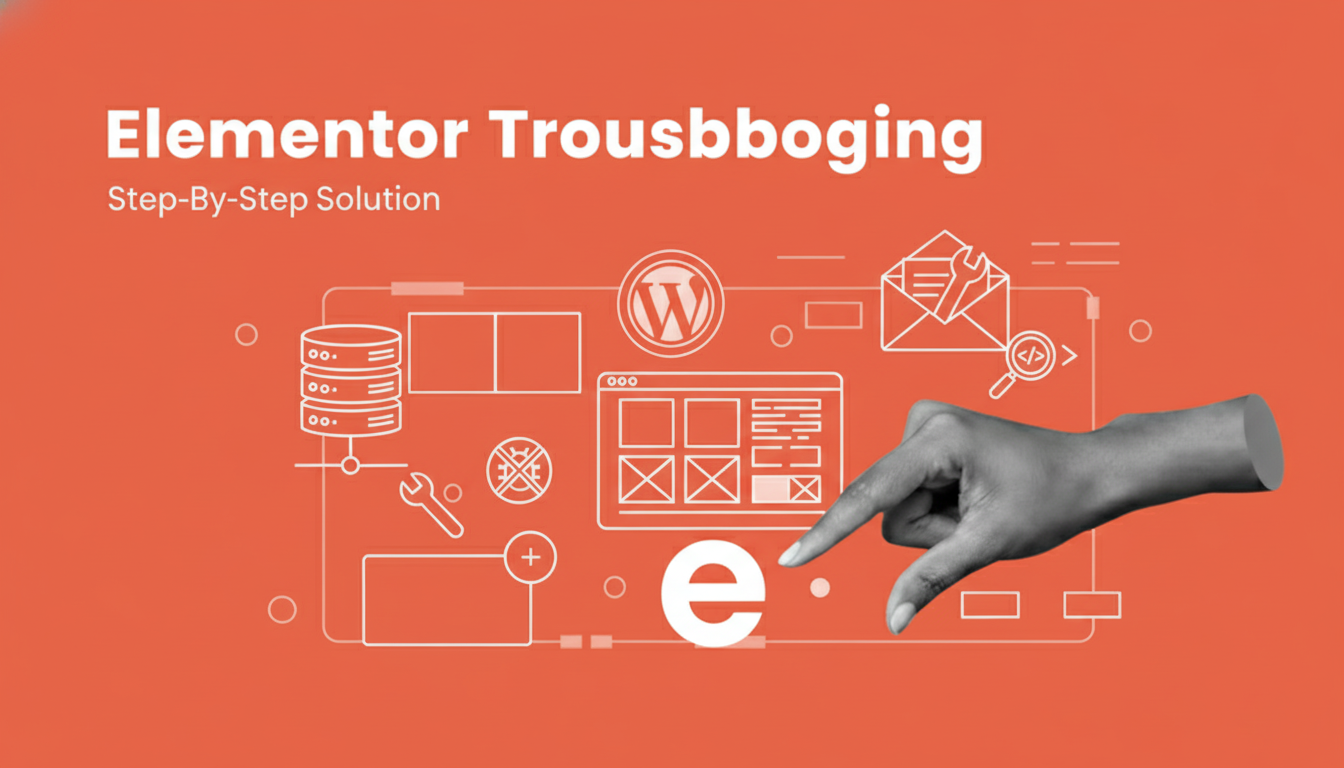“`html
How to Fix Elementor Password Reset Not Working
Ever found yourself locked out of your WordPress site, desperately trying to log in, only for the Elementor password reset feature to stubbornly refuse to cooperate? It’s a frustrating experience, especially when you’re on a tight schedule or need urgent access to your website. You click “Forgot Password,” enter your email, hit send, and… nothing happens. Or perhaps you receive an email, but the link is broken, or it leads to an error page.
As experts at Hostinger and devoted users of Elementor, we understand these challenges intimately. The “Elementor password reset not working” issue can stem from various sources, ranging from simple caching problems to deeper server configuration mishaps or plugin conflicts. But don’t worry – you’re not alone, and we’ve got a comprehensive, step-by-step guide to help you regain access to your site.
In this in-depth article, we’ll explore the most common reasons why your Elementor password reset might be failing and provide multiple actionable solutions. We’ll cover everything from checking your email settings to directly editing your database, ensuring you have all the tools to get back on track. Let’s dive in!
Table of Contents
- Understanding Why Elementor Password Reset Fails
- Initial Checks and Quick Fixes for Elementor Password Reset
- SMTP and Email Delivery Issues
- Plugin and Theme Conflicts
- Direct Database Password Reset (Advanced Method)
- Resetting Password via Emergency Recovery Script
- Common Issues and Troubleshooting for Elementor Password Reset
- Tips and Best Practices to Prevent Password Reset Issues
- Frequently Asked Questions About Elementor Password Reset
Understanding Why Elementor Password Reset Fails
When your Elementor password reset isn’t working, it’s typically not Elementor itself that’s broken. Elementor builds upon WordPress’s core functionality. So, if the password reset fails, it’s often due to underlying WordPress issues, server-side configurations, or conflicts with other elements in your WordPress ecosystem. Here are the most common culprits:
- Email Delivery Problems: The most frequent reason. Your WordPress site might not be sending emails correctly, or the emails are being flagged as spam.
- Caching Issues: Stale cache can interfere with forms and processes, including password reset requests.
- Plugin or Theme Conflicts: Another plugin or your active theme might be clashing with WordPress’s core email functionality or Elementor’s forms.
- Incorrect Email Address: You might be entering an email address that isn’t associated with any user on your site.
- Server Configuration: Your web host’s mail server settings could be misconfigured, preventing emails from being sent.
- Database Issues: Less common, but sometimes database corruption can cause problems.
By systematically addressing these potential causes, we can pinpoint the exact problem and implement an effective solution.
Initial Checks and Quick Fixes for Elementor Password Reset
Before diving into more complex solutions, let’s cover some simple checks that often resolve the “Elementor password reset not working” problem.
Clear WordPress and Browser Cache
Caching can play tricks on your website. If your site or browser is serving up old, cached content, it might prevent the password reset request from being processed correctly or the form from submitting. Clearing the cache is always a good first step.
Step-by-Step:
- Clear Browser Cache:
- Chrome: Go to Settings > Privacy and security > Clear browsing data.
- Firefox: Go to Options > Privacy & Security > Cookies and Site Data > Clear Data.
- Edge: Go to Settings > Privacy, search, and services > Clear browsing data > Choose what to clear.
Try resetting the password again after clearing your browser cache.
- Clear WordPress Cache:
If you use a caching plugin (e.g., WP Super Cache, W3 Total Cache, LiteSpeed Cache), navigate to its settings in your WordPress dashboard and look for an option to “Clear Cache,” “Purge All Caches,” or similar. Many hosts also offer server-level caching. Check your hosting control panel (like hPanel on Hostinger) for caching options and clear them.
After clearing both, attempt the password reset process again.
Check Your Spam Folder
It sounds obvious, but email providers are increasingly aggressive with spam filtering. The password reset email might have landed in your spam, junk, or promotions folder. Always check there first!
Step-by-Step:
- Log in to your email account.
- Look for folders like “Spam,” “Junk,” “Promotions,” or “Other.”
- Search for emails from your website’s domain or “WordPress.”
Verify Your Email Address
Are you absolutely sure you’re using the correct email address associated with your WordPress user account? Sometimes, we have multiple email addresses, and it’s easy to mix them up. The Elementor password reset, like WordPress’s native one, only works for registered email addresses.
Step-by-Step:
- Double-check the email address you’re entering in the “Forgot Password” form.
- If you have access to your site’s database (via phpMyAdmin), you can verify the email associated with your user account in the
wp_userstable (look for theuser_emailcolumn).
Try WordPress’s Native Password Reset
If you’re trying to reset through a custom Elementor form or a third-party login page, try using the default WordPress login page’s password reset option. This can help determine if the issue is specific to Elementor’s implementation or a broader WordPress email problem.
Step-by-Step:
- Navigate to your default WordPress login page, typically located at
yourdomain.com/wp-adminoryourdomain.com/wp-login.php. - Click on the “Lost your password?” link below the login form.
- Enter your username or email address and click “Get New Password.”
- Check your email for the reset link.
If this works, the problem might be with your Elementor-created login form. If it still doesn’t work, the issue is likely with your site’s ability to send emails.
SMTP and Email Delivery Issues
One of the most common reasons an “Elementor password reset not working” is because WordPress, by default, uses the PHP mail() function, which is often unreliable. Many web hosts restrict its usage, or emails sent this way are easily flagged as spam. Using a dedicated SMTP (Simple Mail Transfer Protocol) service is the best solution for reliable email delivery.
Install and Configure an SMTP Plugin
An SMTP plugin reroutes all outgoing WordPress emails through a proper SMTP server, drastically improving deliverability. Think of it like sending a registered letter instead of a postcard.
Step-by-Step:
- Access Your WordPress Dashboard: If you are completely locked out, you might need to use FTP or your hosting file manager to install the plugin.
- Via Dashboard (if you have access): Go to Plugins > Add New. Search for “WP Mail SMTP” (or a similar popular plugin like Post SMTP). Install and activate it.
- Via FTP/File Manager (if locked out):
- Download the plugin ZIP file from the WordPress plugin directory (e.g., WP Mail SMTP).
- Unzip the file locally on your computer.
- Connect to your website via FTP (using a client like FileZilla) or your hosting’s File Manager.
- Navigate to
wp-content/plugins/. - Upload the unzipped plugin folder (e.g.,
wp-mail-smtp) to this directory. - Once uploaded, you will need to activate it. If you can’t access the dashboard, you might need to do this via your database (change
active_pluginsentry inwp_optionstable) or wait until you regain access. For now, just uploading is enough to get ready.
- Configure the SMTP Plugin:
- Go to WP Mail SMTP > Settings in your WordPress dashboard.
- Choose your preferred Mailer. Popular options include:
- Other SMTP: Requires manual input of SMTP host, port, encryption, and authentication details (provided by your host or email service).
- Gmail/Google Workspace: Authenticates via OAuth 2.0, highly reliable.
- SendGrid, Mailgun, Sendinblue, Amazon SES, Outlook: Dedicated email services offering excellent deliverability with specific API keys.
- Hostinger Tutorial: How to Set Up SMTP in WordPress
- Fill in the required details (e.g., SMTP Host, Port, Encryption, Authentication username/password, or API keys).
- Set the “From Email” and “From Name.”
- Send a Test Email: Most SMTP plugins have a test email feature. Send a test email to yourself to confirm the settings are correct and emails are being delivered.
After successful configuration and testing, try the Elementor password reset again. This solution alone fixes the vast majority of “Elementor password reset not working” issues.
Check Your Hosting Provider’s Mail Server
If you’re not using an external SMTP service and relying on your host’s default mail server, there might be issues on their end. Contact your hosting provider’s support (like Hostinger’s 24/7 support) and:
- Ask them to check if the PHP
mail()function is enabled on your server. - Inquire about any outgoing email restrictions or rate limits.
- Ask them to check server mail logs for any failed delivery attempts related to your domain.
They can often provide insights into why your site isn’t sending emails effectively.
Plugin and Theme Conflicts
In the modular world of WordPress, plugins and themes can sometimes conflict with each other, leading to unexpected behavior, including a broken Elementor password reset. This is especially true if a plugin or theme is poorly coded or modifies core WordPress functionalities.
Deactivate All Plugins (Except Elementor)
This is a classic troubleshooting step. By deactivating all plugins, you can isolate whether a conflict is causing your “Elementor password reset not working” issue.
Step-by-Step:
- Access Your WordPress Dashboard: If you’re locked out, you’ll need to use FTP or your hosting’s File Manager.
- Via Dashboard: Go to Plugins > Installed Plugins. Select all plugins (except Elementor and Elementor Pro, if you use it), choose “Deactivate” from the bulk actions dropdown, and click “Apply.”
- Via FTP/File Manager:
- Connect to your website via FTP or File Manager.
- Navigate to
wp-content/plugins/. - Rename the
pluginsfolder to something likeplugins_old. This effectively deactivates all plugins because WordPress can no longer find their directories. - Refresh your site. All plugins are now deactivated.
- Attempt Password Reset: Try the password reset process again.
- If it works: A plugin conflict was the culprit.
- Via Dashboard: Go back to Plugins > Installed Plugins and reactivate your plugins one by one, testing the password reset after each activation until you find the conflicting plugin.
- Via FTP/File Manager: Rename
plugins_oldback toplugins. Then, from the WordPress dashboard, deactivate all plugins. Reactivate them one by one, testing after each, to identify the problematic one.
- If it doesn’t work: The problem isn’t with other plugins, suggesting you reactivate them all.
Once identified, you can either seek an alternative plugin, contact the developer for support, or report the bug. Always ensure all your plugins are updated to their latest versions, as developers often release fixes for known conflicts.
Switch to a Default WordPress Theme
Similar to plugins, your active theme can also interfere with core WordPress functionalities, including email delivery or password reset forms, especially if it includes custom login or user management features.
Step-by-Step:
- Access Your WordPress Dashboard: Again, if locked out, you’ll need FTP/File Manager.
- Via Dashboard: Go to Appearance > Themes. Activate a default WordPress theme like Twenty Twenty-Four, Twenty Twenty-Three, or Storefront (if you use WooCommerce).
- Via FTP/File Manager:
- Connect via FTP or File Manager.
- Navigate to
wp-content/themes/. - Find your currently active theme folder (e.g.,
astraorhello-elementor). Rename it to something likemytheme_old. - WordPress will automatically fall back to a default theme (e.g., Twenty Twenty-Four) if one is present. If you don’t have a default theme, upload one to this directory first.
- Attempt Password Reset: Try resetting your password.
- If it works: Your theme was the issue. Contact the theme developer for support or consider switching




























